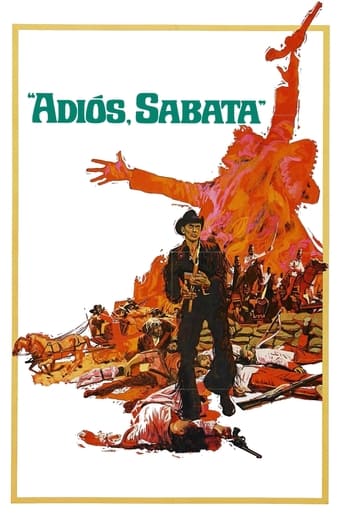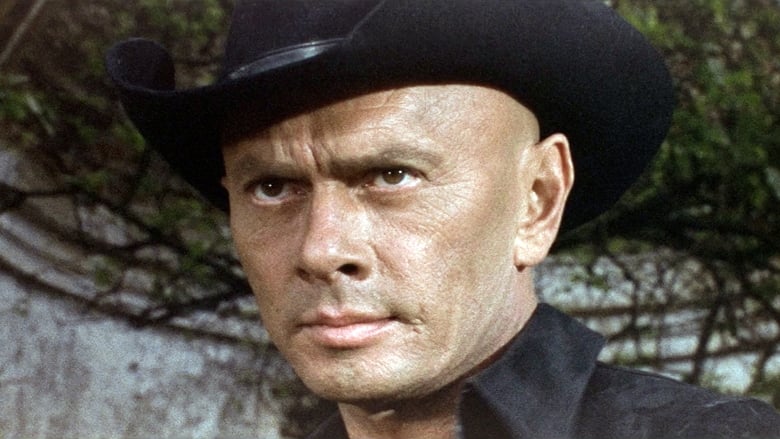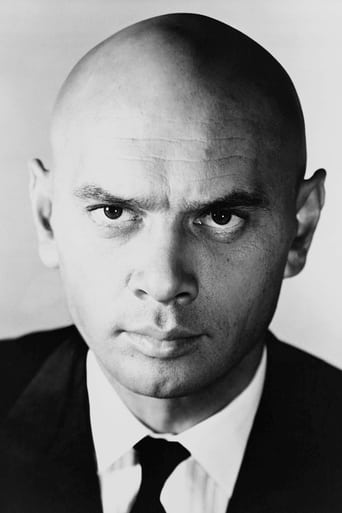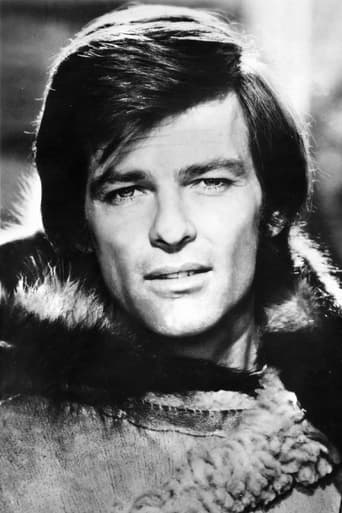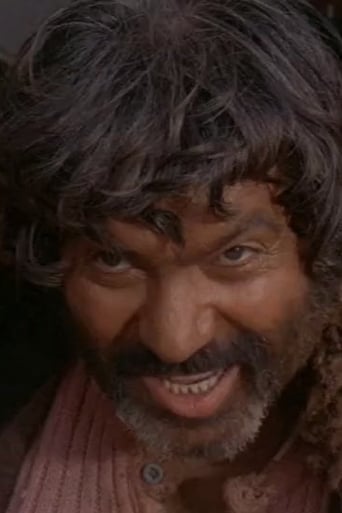Adiós, Sabata (1971)
Set in Mexico under the rule of Emperor Maximilian I, Sabata is hired by the guerrilla leader Señor Ocaño to steal a wagonload of gold from the Austrian army. However, when Sabata and his partners Escudo and Ballantine obtain the wagon, they find it is not full of gold but of sand, and that the gold was taken by Austrian Colonel Skimmel. So Sabata plans to steal back the gold.
Watch Trailer
Cast
Reviews
Absolutely the worst movie.
It is not deep, but it is fun to watch. It does have a bit more of an edge to it than other similar films.
I cannot think of one single thing that I would change about this film. The acting is incomparable, the directing deft, and the writing poignantly brilliant.
By the time the dramatic fireworks start popping off, each one feels earned.
The second Sabata film mixes the Mexican Revolution plot with the stolen Gold plot and manages to make it work through an avalanche of stupid characters and the fact that instead of the usual bounty hunters and bandits the bad guys are a bunch of arrogant Austrians up for a killing. One of them even says 'I'll be back!' Yul Bryner plays Sabata this time round, a bounty killer with a good heart and no concept of money. The money he makes from shoot outs goes to the local monastery (they don't approve!), so when he's roped into killing one of the local Austrian senior officers he's all for it, until he realises that this is your usual double crossing gold stealing plot.All is not lost. Even though this plot is played out like some Western frontier mine, we still get a few quirks to keep our attention, like Sal Borgese's mute bandit character. He doesn't say much, but he has two musket balls that he drops into special pockets in his shoes that he then fires at people's heads. He also has a friend who dances while the head bandit guy prepares to kill someone.There's also an insanely high body count even for a film like this, where most of Mexico is killed in a barrage of dynamite and bullets, and of course there's the tenuous relationship between Yul and the other good guy that results in gold swapping hands various times which leads to an ending which drags on slightly for those who have witnessed it several times by this point.
This was not filmed as a sequel to "Sabata", but was redubbed and retitled as a sequel to that film when it came to North America. But I don't think anyone will care one way or another, because what we have here is a coooooooool spaghetti western! It obviously had a decent budget, because the look of the movie is spot on, from the sets to the very colorful backdrops. And the production also had the money to hire Yul Brynner, who makes for a very good anti-hero, cool under pressure and tough but always striving to do the right thing. Most importantly, he gets into a lot of action, and the action sequences are exciting and have a high body count. And boy, does the movie have a lot of style, from some crazy camera-work to unforgettable moments like the "flamenco of death"! Are there any flaws in this movie? Well, if pressed, I would admit that there is one real flaw; I think the movie is a little too long. If it had been about fifteen or so minutes shorter, I think it would have moved much better. But better to be cool, stylish, and long, rather than be shorter and without passion or bite.
In his one and only venture into the pasta western, Yul Brynner finds himself succeeding Lee Van Cleef as the mysterious gunfighter Sabata who gets himself involved in Mexican politics in trying to overthrow the Emperor Maximilian. There hasn't been a film yet where the Juaristas aren't the good guys, even in Juarez where Brian Aherne made a sympathetic if somewhat naive Maximilian. It's such a clear case of imperialism.But Yul isn't a total good guy and he teams up with three partners to steal a shipment of gold from the occupiers and give it to the Juaristas ostensibly. Actually the four of them are only as good as they have to be. And they've got another along, an American played by the only American actor in Adios Sabata, Dean Reed, who has an agenda all his own who keeps a positively explosive diary.As most of us know even those who get their history from films, the Emperor Maximilian was an Austrian, but who was put on the newly created Mexican throne by the French and sustained by the French army. But here we have Austrian occupiers including an Austrian commander who also has a private agenda. I'm betting the producers were thinking that German types make so much better villains than the French.Sabata's distinguishing characteristic was a rife that he had a long holster for and drew like a revolver. This rife had a unique horizontal magazine from where the bullets came. But the last chamber always had a cigar which Yul would light up after a killing well done.I'm not a fan of spaghetti westerns and don't usually give them good reviews. It's the American genre and should be done by Americans. This one is no exception. But I will say that Yul Brynner's cynical look throughout the film is quite priceless.
Firstly, this is *not* a sequel to 1970's "Sabata" ("Ehi amico... c'è Sabata, hai chiuso!") although it can be considered a follow up of sorts. Lee Van Cleef did not reprise the role until 1971's "Return of Sabata". "Adiós Sabata" was originally about a character called Indio Black and completely unrelated to the previous Sabata story - Indio, I believe, was meant to be nothing more than a bandit. The name was changed to cash in on the success of "Sabata" - though this film could be considered a true Sabata entry as a couple of stars return (Pedro Sanchez, Gianni Rizzo) and the screenwriters and director are the same. Gianfranco Parolini (Frank Kramer) perhaps out does the previous film here, keeping everything tighter - "Sabata" was a little too jokey (although still excellent and one of the truly great Italian westerns) whereas this is blatantly tongue in cheek. I feel the music is better in this film, never intrusive and always fitting: a triumph for Bruno Nicolai, despite the fact that it is incredibly reminiscent of Morricone.As Sabata, Brynner is a kind of anti-hero counterpart to Chris from "The Magnificent Seven"; he even dresses out all in black here too. Gérard Herter is great as the Austrian Colonel Skimmel at the time of Emperor Maximillian's Mexico - a kind of borderline camp, Bond villain type, complete with monacle and perfectly trimmed moustache. Oh, and yes, he is a dead shot with a rifle. In "Sabata", Franco Ressel's Stengel had his shootout's behind man shaped shields (to live at the peak of danger or some such nonsense) as his playtoy; Herter's Skimmel has an even better one - a drawer beneath a model ship that when opened fires each cannon on the model directly into whoever opens the drawer. Like "The Good, the Bad and the Ugly" (which this film contains some surprisingly subtle references to) the plot centres around a shipment of gold: Sabata, Escudo (Sanchez) and Ballantine (Dean Reed) want the wagon load of gold, but it is also coveted by Maximillian's rebels. The scenes with the gold and the gold dust being poured out/spilled is nicely complimented by Nicolai's incidental music which really does bring out the joy of the characters.I personally think it's a shame that Brynner and the others weren't brought back for another Sabata film because he plays the role much straighter than Van Cleef did and really does come across as a tough guy here, who doesn't need to rely on his gun. "Adiós Sabata" is a classic in it's own right and doesn't need to be viewed with the other Sabata entries. It's only downside is that after surpassing the superb original, it left most people disappointed with the later "Return of Sabata".Are these subtle hints to Leone's 1966 masterpiece? Sanchez: "Me, I'd make a hiding place no-one would find - stick it in the ground, maybe in a cemetery..." Reed (the last line): "Hey fellas - are you gonna help me pick up the gold or not, you sons of...!" (music takes over)
